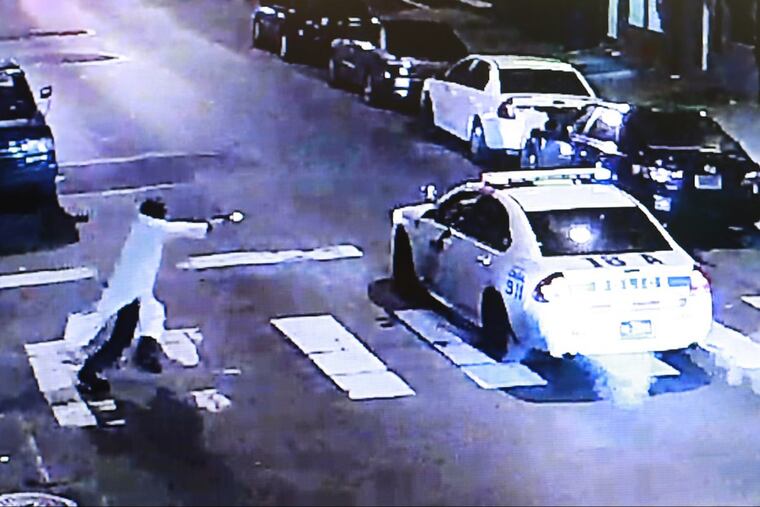Philly cop's accused ISIS-inspired shooter scheduled for trial Monday
Edward Archer, accused of shooting Officer Jesse Hartnett during an ISIS-inspired ambush in West Philadelphia in 2016, is scheduled to go to trial beginning Jan. 22, 2018.

The revelations kept coming.
First, the phone rang in the middle of the night, waking Police Commissioner Richard Ross. An officer had been shot in West Philadelphia. Details were sketchy.
Then, after Ross arrived at Penn Presbyterian Hospital, investigators showed him harrowing photos of the attack, in which the shooter could be seen approaching the officer's police cruiser, arms outstretched, gun in hand, unloading bullets into the driver's side.
And the next morning, as Ross walked into police headquarters, someone told him the accused gunman had confessed to acting "in the name of Islam."
"This thing," Ross recalled last week, "continued to take off like an airplane in terms of getting worse."
Two years have passed since officer Jesse Hartnett survived that ambush-style attack, which attracted international attention — and was referenced by Republican presidential candidates — due to its purported link to ISIS.
This week, the man accused of pulling the trigger, Edward Archer, is finally scheduled to stand trial in Philadelphia's Criminal Justice Center, potentially shedding light on his alleged motive, which has played a minimal role thus far in court proceedings.
Part of the reason may be due to Archer's behavior since his arrest. His lawyer has said the 32-year-old has avoided participating in almost any aspect of the case, refusing to speak with him or to submit to mental-health evaluations. At a hearing last month, Archer declined even to provide his name for the record.
Prosecutors at his preliminary hearing did not present evidence bolstering any connection to ISIS or other extremist groups, and former FBI director James Comey said investigators never found a connection between Archer and an organized terrorist cell.
Still, prosecutors don't have to prove a motive at the trial, which is scheduled to begin with jury selection Monday. And the potential to discover more about Archer's rationale is just one reason the case is likely to be watched closely by those in law enforcement.
Another is that a resolution could mark the final chapter in a case that shocked the city.
"I still struggle to [comprehend] the entirety of it all," said Ross.
‘Miracle’ survival
Hartnett was alone in his police car the night of Jan. 7, 2016, patrolling the area around 60th and Spruce Streets when Archer allegedly approached and began peppering his vehicle with gunfire. At one point, surveillance video appears to show Archer reaching into the car and continuing to shoot.
Hartnett was hit several times but survived, then used his legs to open the door and return fire as Archer fled.
The officer suffered a broken arm and nerve damage, but Ross said last week it was amazing he made it out of the car at all.
"It's a miracle that Jesse Hartnett is still here," he said.
At Archer's preliminary hearing, Hartnett said the incident occurred without warning.
"I didn't hear [Archer] say anything," he said.
Archer was taken into custody soon after the shooting, and police said that during an interrogation with homicide detectives he professed allegiance to the Islamic State.
That revelation, made public the day after the shooting, prompted attention from around the world. Sen. Marco Rubio (R., Fla.) mentioned the shooting during a Republican presidential debate, and Ross said the department fielded calls from news organizations as far away as Europe.
Officials also disclosed that Archer's weapon was a police-issued firearm that had been reported stolen from an officer's home in 2013.
It remains unclear how he obtained the gun. And few other additional details were disclosed about Archer's supposed motive — although evidence began surfacing that mental illness may have been partly to blame.
Archer's mother, Valerie Holliday, said the day after the crime that her son had been "talking to himself" and hearing voices.
His lawyer, Trevan Borum, sought last month to have Archer ruled incompetent for trial, arguing that his consistent lack of cooperation showed that he was incapable of understanding the potential consequences he faces. Judge Leon W. Tucker disagreed, ruling that Archer was aware of the charges against him and simply chose to avoid participating in his defense.
Whether mental illness plays into his defense strategy remains an open question. But whatever influenced him, Archer — who faces counts including attempted murder, aggravated assault, and assaulting a law enforcement officer — could spend the rest of his life behind bars if found guilty.
The trial is expected to last at least a week.